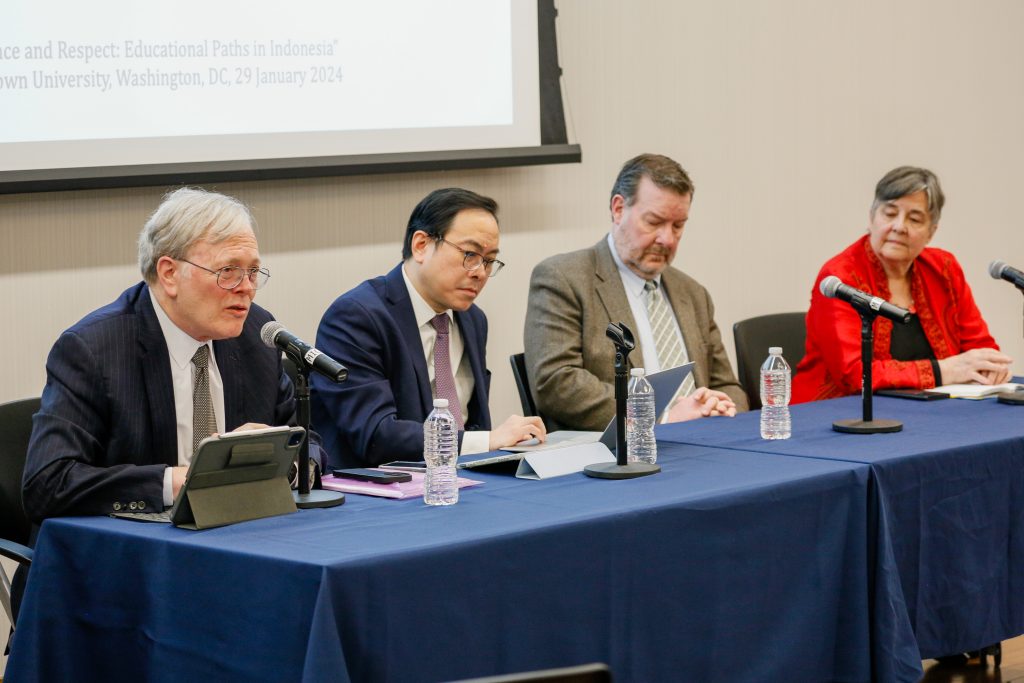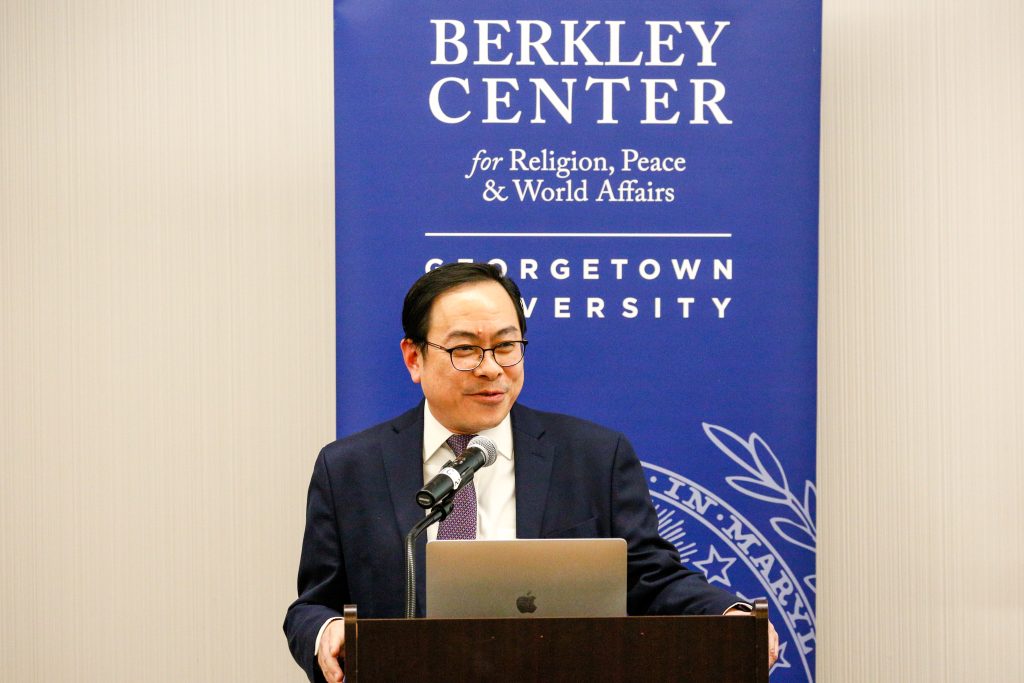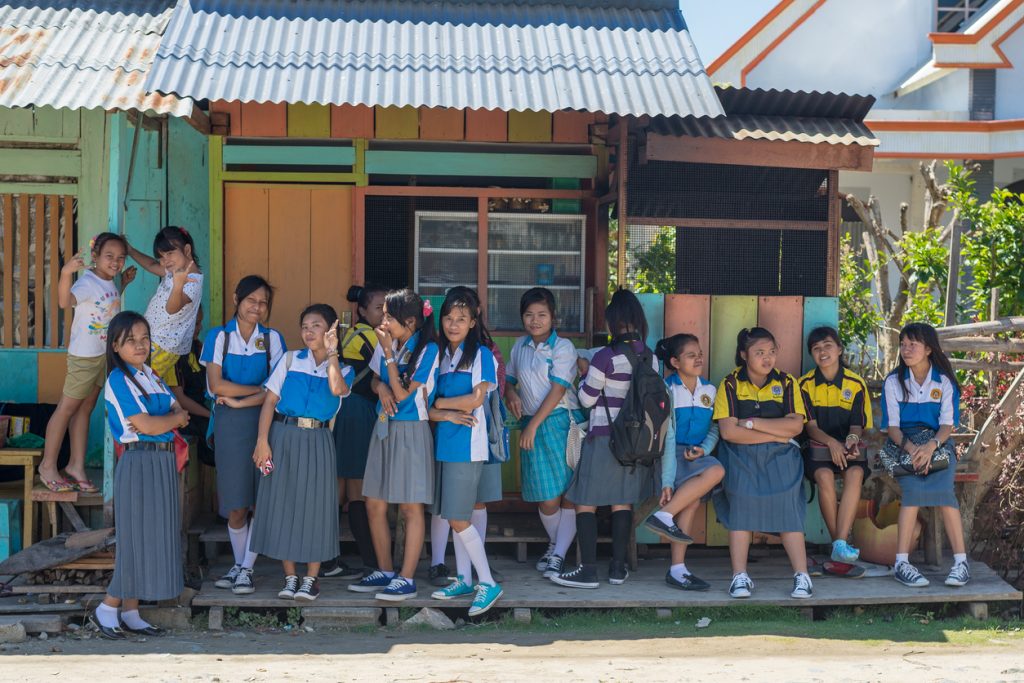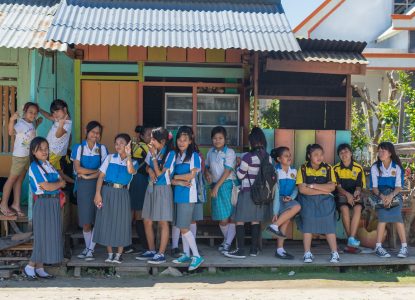By JoAnne Wadsworth, Communications Consultant, G20 Interfaith Forum
– – –
On January 29th, 2024, the Berkley Center for Religion, Peace and World Affairs at Georgetown University, in partnership with the G20 Interfaith Forum, convened a panel discussion entitled “Tolerance and Respect: Educational Paths in Indonesia.” Panelists included Matius Ho, Executive Director of the Leimena Institute in Indonesia; Chris Seiple, President Emeritus of the Institute for Global Engagement and Principle Advisor to the Templeton Religion Trust; and Katherine Marshall, G20 Interfaith Forum Vice President and a Senior Fellow at the Berkley Center. W. Cole Durham, Jr., President of the G20 Interfaith Forum, moderated the discussion. Read the Berkley Center’s summary of this same meeting here.
The focus of the discussion was an innovative program launched in Indonesia to promote cross-cultural religious literacy, with potentially broader implications worldwide.
Professor Durham opened the discussion by introducing the concept of cross-cultural religious literacy (CCRL), which he described as developing essential competencies and practical skills for engaging across religious and cultural differences. This stands in contrast to a view of religious literacy as merely gaining knowledge about other religions.
He said that CCRL has the potential to work not only in the context of Indonesia, but that it could be a vital tool to help address the UN’s sustainable development goals, many of which align with concerns and objectives that religious communities have had foro longer than there have been nation-states. He noted that although religious groups are deeply concerned with issues like justice, climate change, health, and education, they are not currently included in policymaking discussions at events like the G20 summits. He then invited each of the panelists to discuss the CCRL program in Indonesia and its results.

Chris Seiple
Chris Seiple expanded on Durham’s framing. He explained that his history in the Marine Corps and experiences at the Institute for Global Engagement had taught him the importance of both hard and soft power, strengthening his desire to engage with respect and execute with excellence in his efforts with the Templeton Religion Trust. He said that CCRL aims to teach three core competencies:
- Evaluating one’s own beliefs (what do my own scriptures/morals say?)
- Evaluating others’ beliefs about oneself (what do theirs say about me?)
- Building collaborative skills across lines of difference
It also imparts practical skills like critical evaluation, nuanced negotiation, and clear communication.
“CCRL moves discussions beyond platitudes or cliches into nuanced mutual understanding. It imparts competencies and skills regarding how to engage with people who don’t look, act, vote, or pray like you do.”
Seiple said CCRL is different from “Religious Literacy” as understood in the US State Department. It isn’t just knowledge about the other; it borrows from the field of conflict resolution and teaches people to better understand their own beliefs and what unplanned effects those beliefs have on other people. The emphasis on culture is also important, because often people are scared of the concept of religion, though it’s part of culture. Culture and religion are distinct and independent, but heavily borrow from each other. In conclusion, he emphasized CCRL’s power to reduce extremism by creating spaces where people can fully express their religious identities while simultaneously engaging respectfully with others who do not share their beliefs or background.
Matius Ho
Matius Ho, Executive Director of Indonesia’s Leimena Institute, then gave an overview of the CCRL education program launched by his organization in collaboration with Templeton Religion Trust.
Ho explained that Indonesia is an enormously diverse country, with over 270 million people, hundreds of languages and ethnicities, and a national ideology founded on unity in diversity. The country also boasts the world’s largest Muslim population, though there is no official state religion. However, in recent years there have been growing tensions and hostilities between religious groups. In fact, a survey conducted across Indonesia from 2017-2018 found that Muslim school teachers across the country had the highest reported instances of intolerant and radical opinions.
Seeing this growing problem, Ho brought the CCRL framework to Muslim scholars in his network, and they used it to develop a program. In 2021, they launched that program and the Leimena Institute began training Indonesian K-12 teachers and religious educators in CCRL principles and pedagogy. The program teaches introspective evaluation of one’s own beliefs, perspective-taking on how others view your community, and building collaborative capacities across groups. It also exposes teachers directly to different religions and places of worship.
Step 1 of the training program is a 5-day online introductory course to CCRL, where each faith’s module is taught by scholars who are part of that faith. The program has Muslim, Christian, and Jewish modules, and is currently finalizing its Buddhist, Hindu, and Confucianist modules.
Step 2, the alumni program, provides activities for the teachers to undergo and resources for further study, including workshops where teachers are trained to develop lesson plans that incorporate CCRL principles, visit different places of worship, and send video examples of how they’re teaching in the classroom using these principles so that others can benefit. Over 70% of participants have sent videos like this, developing a sizable database.
Remarkably, within two years the CCRL program has reached over 6,000 teachers from 34 Indonesian provinces across Muslim, Christian, Buddhist, Confucian, and other backgrounds. Ho shared a moving video of Christian school students interacting with Muslim students at a visit to the Muslim Madrasa, initiated by teachers on both sides who went through the program.

Why is it Working?
In examining CCRL’s rapid and transformative impact in Indonesia, Seiple pointed to several vital elements that make the approach effective.
- First, CCRL allows people to express the full substance of their faith identities without fear of inadvertently offending others, enabling meaningful engagement.
- Second, because CCRL is not imposed but voluntarily embraced, it empowers local agency and leadership – nobody is selling anyone anything.
- Third, the practical benefits like professional development certifications create real incentives for participation.
“Everyone has a yearning to be able to express their faith identity in its entirety without offending somebody. This framework helps people express the full substance of their beliefs and engage in a safe way. Practical collaboration accelerates because you aren’t walking on eggshells.”
He said the CCRL framework is being implemented in Kazakstan this fall, teaching government representatives and law enforcement officers. As the local context is quite different, people are filling in the framework according to their needs, with an emphasis on allowing officials to bring their whole selves to their jobs while still showing respect for the other.
Envisioning CCRL’s Potential Global Influence
In conclusion, Katherine Marshall emphasized that the kind of sophisticated religious literacy modeled in Indonesia’s CCRL program is urgently needed worldwide in order to enable meaningful communication and effective policymaking. Religious dimensions are real but often unacknowledged forces shaping societies and geopolitics globally, with 84% of the world’s population reporting a religious affiliation. However, large parts of diplomacy and public policy simply do not mention religion.
She lauded the CCRL program’s ability to take the religious dimension that is such a clear and important part of Indonesian culture, politics, and society, and consider it in practical action. She then pointed to two specific issues the G20 Interfaith Forum is working with where CCRL training could offer key contributions:
- Post-COVID pandemic preparedness and social recovery, where a sharp focus has been placed on educational system failures and building citizenship, character, and social cohesion.
- The concept of strategic religious engagement, where we work to bring the best of the religious voice into the global agenda.
Professor Durham closed by underscoring CCRL’s potential to overcome harmful stereotypes and transform how religious diversity is engaged within educational systems, diplomacy, law enforcement, economic development programs, and more. With issues of existential global importance on the line, the promising case study of Indonesia’s CCRL initiative points to the need for global policymakers to prioritize education in competent and ethical religious literacy.
“From my perspective, thinking about IF20, CCRL should be a central methodology. It’s very powerful to see these frightening statistics that the people teaching Indonesian children are amongst those most inclined to radicalism. But with this program, people have been open to learning. … If we can get CCRL to work not only in these powerful training programs (which countries are hungry for), but mainlined in educational systems and other training programs for diplomats, law enforcement, state departments, and more, it would be an amazing thing.”

– – –
JoAnne Wadsworth is a Communications Consultant for the G20 Interfaith Association and acting editor of the “Viewpoints” blog.


